04 March 2016
Here are the spellings for this week:

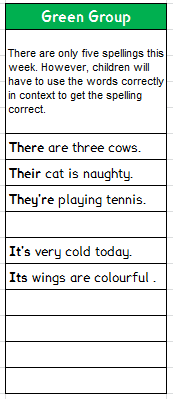
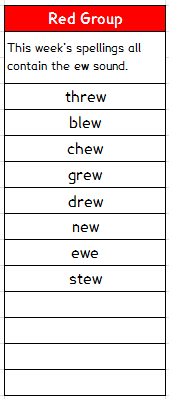
04 March 2016
This week’s spellings all require ‘ed’ to be added for past tense and are words that we often make mistakes with in class (for example, by missing the ‘e’).
| to happen happened |
| to wonder wondered |
| to abandon abandoned |
| to stutter stuttered |
| to listen listened |
| to chat chatted |
| to chatter chattered |
| to clatter clattered |
| to remember remembered |
| to whisper whispered |
These must be practised in your red spelling book ready to be tested on Friday 11 March.
26 February 2016
This week’s spellings are all adverbs. Adverbs describe how a verb (an action) is being done.
sad sadly
usual usually
final finally
comic comically
happy happily
angry angrily
gently gently
simply simply
frantic frantically
dramatic dramatically
These spellings have all been formed by adding the suffix -ly or -ally to a root word. The meaning of the root word helps us to understand the meaning of the adverb. Take “running comically”. The root word of comically is comic, which means to be funny, so running comically would be running in a funny way.
Why not try spelling pyramids to help practise this week?
g
ge
gen
gent
gentl
gently
26 February 2016
Here are the spellings for this week:
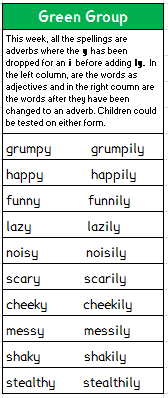
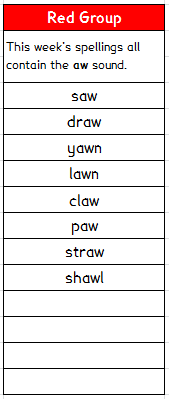
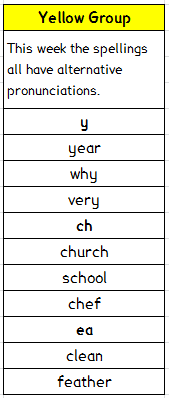
26 February 2016
This week’s spelling are a little different. I won’t be sending a list of spelling for the children to learn but a spelling rule to practise instead:
double up for a short vowel sound
At home, see if you and other members of your family can think of words that follow this rule and practise these. Remember the different ways we’ve used to practise spelling:
- pyramid spelling
- word shapes
- missing letters
There will be a test on Friday and all of the words tested will follow the double up rule.
05 February 2016
The week’s spellings are all singular and plural possessives. We’ve been looking at the role of apostrophes in the contracted form (can’t…don’t…won’t) and are now focussing on how they are used to mark possession (the cat’s pyjamas are the pyjamas that belong to the cat).
For this spelling task we’re focussing on using ‘s for singular nouns (one cat’s pyjamas) and s’ for plural nouns (two cats’ pyjamas).
Your child needs to find five interesting nouns that link to our Life topic. A noun’s job is to name things, people or places. Once they have chosen five spellings, they must work out the singular and plural possessives for their nouns. Usually, adding an -s to the end of a noun will make it plural and all that is required is an apostrophe after that s to mark possession. However, some nouns have irregular plurals which must be learnt. For example, if a noun ends in a y you have to drop the y for an i and add es (like ‘ladies’ from last week’s list). Additionally, some nouns have even more unusual spelling rules for the plural (one sheep, two sheep; one cactus, two cacti). The best way to check this is to go onto the internet and search for your nouns plural e.g. cactus plural, sheep plural.
05 February 2016
Here are the spellings for this week:
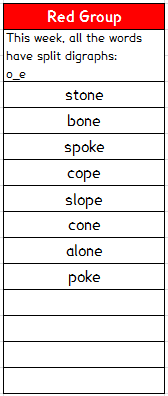
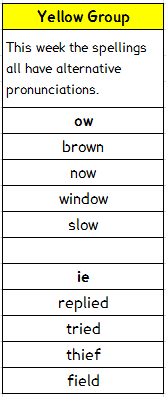
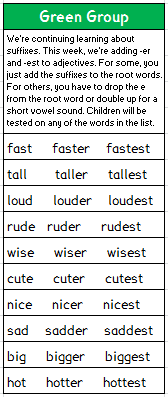
29 January 2016
Here are the spellings for this week:
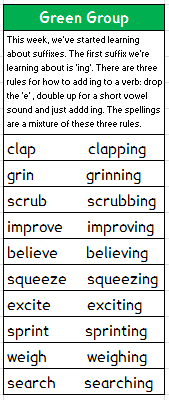
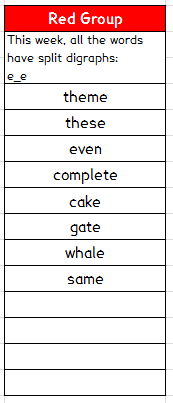
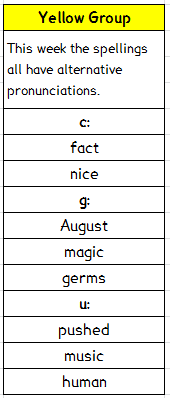
29 January 2016
The week’s spellings are all singular and plural possessives. We’ve been looking at the role of apostrophes in the contracted form (can’t…don’t…won’t) and have started to look at how they are used to mark possession (the cat’s pyjamas are the pyjamas that belong to the cat).
For this spelling list we’re focussing on using ‘s for singular nouns (one cat’s pyjamas) and s’ for plural nouns (two cats’ pyjamas).
one girl’s (…house – the house lived in by one girl)
two girls’ (…house – the house lived in by the two girls)
one boy’s
two boys’
one owl’s
two owls’
one ferret’s
two ferrets’
one lady’s
two ladies’
22 January 2016
This week, we are our continuing our spelling focus on homophones. Why not try illustrating this week’s homophones to make them more memorable? See below for some ideas.

fair: treating people equally
fare: the money paid on public transport
great: above average
grate: to shred food
groan: a sound of despair
grown: to have increased in size
main: the most important
mane: the long neck hair of some animals
meat: the flesh of an animal (which some people choose to eat)
meet: to be in the same place as someone else at the same time (in the word, the two e letters meet up)